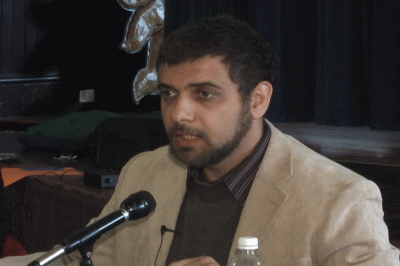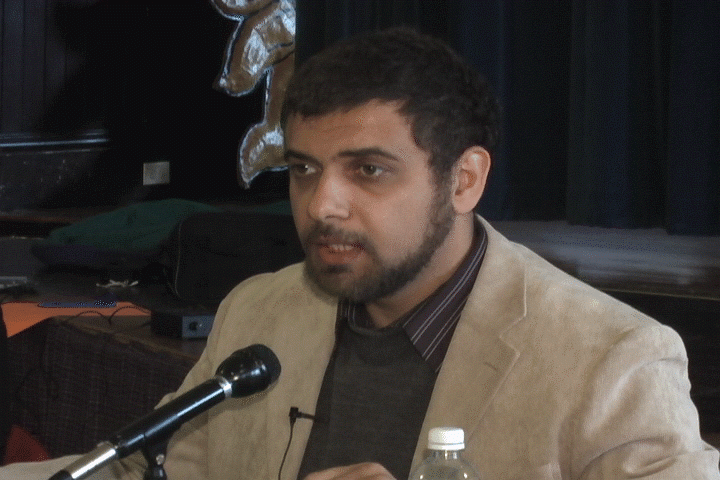 Raed Jarrar is an Iraqi-American blogger and political analyst based in Washington, DC. Niki Akhavan is an Iranian-American professor of media studies at Catholic University. They talked with FPIF about the roots of Islamophobia, how anti-Islamic sentiment has shaped U.S. foreign policy, and the relationship between faith and violence.
Raed Jarrar is an Iraqi-American blogger and political analyst based in Washington, DC. Niki Akhavan is an Iranian-American professor of media studies at Catholic University. They talked with FPIF about the roots of Islamophobia, how anti-Islamic sentiment has shaped U.S. foreign policy, and the relationship between faith and violence.
John Feffer: Let’s start with Islamophobia. Where does it come from?
Raed Jarrar: I’m critical of the theory that Islamophobia comes from an ancient conflict and hatred between Christians and Muslims, between “us” and a distant “other.” Here, there is a fear of American citizens who happen to have another faith. This is a new anti-religious wave that borrows from similar ones that happened in the past.
Niki Akhavan: I’m critical of the overall thesis of the “clash of civilizations.” There’s no historical context to it. It’s posed as an historical reality, that there’s been a clash since the advent of religions. But when it’s presented to us, the historicity of it is sucked out of it.
Raed Jarrar: There’s historic precedence to the U.S. foreign policy agendas being a pretext for discrimination against and demonization of other religions and ethnicities. The demonization of Africa and Africans had a foreign policy component. During World War II, there was discrimination against Japanese-Americans; during the U.S. wars in Latin America, people of Latin American descent suffered discrimination. This kind of demonization makes it easier for the United States to pursue its foreign policy, makes it easier to kill people who are “less than human.” During the Vietnam War, they used to say that in eastern cultures, death is not as painful as it is here in the United States. The wave of anti-Islam sentiment is not really about Islam – it’s about the fact that Palestinians and Iraqis and Afghanis and Sudanese happen to be Muslim.
John Feffer: Has the election of President Barack Obama changed anything?
Niki Akhavan: I don’t see Obama’s role as alleviating tensions between Muslims and Christians. He reinforces the division. Any time he is asked whether he is of Muslim heritage or holds Muslim beliefs, he doesn’t respond, “no, but what’s wrong with that?” He’s always reaffirming his Christianity. During his campaign, he didn’t go to a mosque. He asked two people in hijab to move from behind him on a stage so that they didn’t show up in pictures. He didn’t go to a Sikh temple because he didn’t want to cover his head and be mistaken for a Muslim. There’s been a continuity in the anti-Muslim sentiment that wasn’t broken by the Democratic victories in 2008. And a lot of the current anti-Muslim sentiment has had to do with the fact that the 2010 election was around the corner.
Raed Jarrar: The timing of what happened has to do with the fact that the right wing has been trying to mobilize its base around something. It found a very convenient way to take advantage of the anti-Muslim rhetoric coming out of the government since 9/11. They accused Obama of being a Muslim, because that was a “crime,” you see. More than 50 percent of Republicans believe Obama is a Muslim. The base gets up in arms whenever there’s a sexy enemy, whether it’s communists or Muslims. The right wing has used this anger against the president’s character. He’s black, his middle name is Hussein, he’s a “secret Muslim.”
The Bush administration rhetoric, although very careful in distinguishing so-called good Muslims from so-called bad Muslims, did create the conditions for fear and hatred against Muslims. This was galvanized in a clearer way in the last few years. There was a front page article in The New York Times recently on the rise of anti-Muslim hate crimes in the United States: 2009 was the highest on record, more than five times the number of 2001, and 2010 will break that record. Anti-terrorism rhetoric is becoming anti-Muslim rhetoric. Anti-foreign terrorism rhetoric is becoming anti-domestic Muslim sentiment, a fear of Muslims in your neighborhood.
Niki Akhavan: The anti-Muslim sentiment is a vehicle for making the link between foreign and domestic, for bringing that fear of Muslims home.
John Feffer: Is there any difference between how the left and the right address this anti-Muslim sentiment in its linkage of foreign and domestic policy?
Raed Jarrar: On most foreign policy issues, the right-wing hardliners in the United States set the framework of thinking and then liberals play within the framework. Liberals make that framework nicer. For instance, the right-wing hardliners set the framework of occupying Iraq, then the liberals try to make it a nice occupation. The right-wing hardliners set the framework that Muslims are a backwards, evil, anti-American group, then the liberals say that some of the Muslims are nice, some of them don’t oppress their women. This is like one person saying, “I think all black people are thieves” and another person says “I don’t believe that all black people are thieves.” If you are using that as a reference point, then you are actually reaffirming the framework.
The left has not challenged the basis of anti-Muslim rhetoric, which considers Muslims un-American, as something outside. Why aren’t we looking at Muslims in the United States as citizens with constitutional rights? Why are we looking at their religion under the microscope and evaluating it? Once you put their religion under a microscope, you are still basing your evaluation on an assumption that their rights are qualified. They must work for their rights. If they treat their wives in a good way, we will respect their rights. They have to earn their rights.
Niki Akhavan: There is almost a condescending inclusion of the other as the other, as Muslims first and foremost, not as Americans. This also has consequences for all the people from Muslim heritage but who don’t identify as Muslims. They are put in a position where they have to identify as Muslims because they don’t want to be seen as hostile to Muslims. And then the Muslim community says, “Who are these people who come out and act as spokespeople for us?”
Raed Jarrar: There are many well-intentioned Americans who try to address the issue as if it were a religious or cultural conflict. They bring together a rabbi, an imam, and a priest to talk about how to get out of this situation. They bring together Muslim, Jewish, and Christian children to play together so there can be friendships in the next generation. But this is delusional. The reason we have conflicts with countries with majority Muslim population is political not religious. The Iraqis have negative attitudes toward the United States because we are occupying their freaking land, not because they are majority Muslim and we are majority Christian. Islamophobia and anti-Muslim policies did not come from a misunderstanding of the other’s faith but from military interventions that have killed and injured other people. If we don’t address the root causes of where the feelings come from, we are just wasting time.
Sometimes I speak at high schools where students don’t even remember 9/11 that clearly. I ask them all the same question. “Be candid,” I say. “What is the first thing that comes to mind when I give the following description: a Middle Eastern man in his early 30s with facial hair.” They say: terrorist, bad guy, suicide bomber. And I say Jesus. They just don’t think of a Middle Eastern guy with facial hair as a peaceful man.
John Feffer: You mentioned suicide bomber. Robert Pape talks about suicide bombing as a response to occupation. Does it have anything to do with religion?
Raed Jarrar: Suicide bombing? Yes, it has something to do with religion or nationalism, with faith. You have to have faith to sacrifice yourself for your community. The reason for the Japanese kamikaze or the Muslim fighter in Iraq or the U.S. marine jumping on a bomb – or any soldier putting themselves in danger to protect their country – is ultimately religious or nationalist. But it is not unique to Muslims. Winston Churchill actually bragged that the British were so nationalist and anti-Nazi that they would tie themselves to bombs and run at tanks. Suicide bombing is not a strategy or belief on its own. It’s a military tactic. If suicide bombers have IEDs to put on the side of the road, they will stop their suicide bombing. If the Japanese had bombers that could go both ways, they would have done that.
Niki Akhavan: There is a well known exchange between a French journalist and an Algerian fighter which goes something to the effect of “Why do you put bombs in baby strollers?” And the fighter said, “Give us your tanks and we’ll give you our baby strollers.”
Raed Jarrar: All through the imperialisms and interventions led by superpowers against “savage peoples” whose countries are occupied, there was a very clear distinction between good force and bad force. Killing 200 civilians with a laser-guided bomb is a civilized force, but suicide bombing is a savage force. That is an invalid argument. If you are against violence, you are against both types. If you are for violence, both tactics are legitimate. The double standard in the United States comes from a criticism of the means without looking at the bigger conflict.
This is the sixth interview in the special focus on Islamophobia. Earlier interviews were with John Esposito, Juan Cole, the Islamic Human Rights Commission, Phyllis Bennis, and Arun Kundnani.
